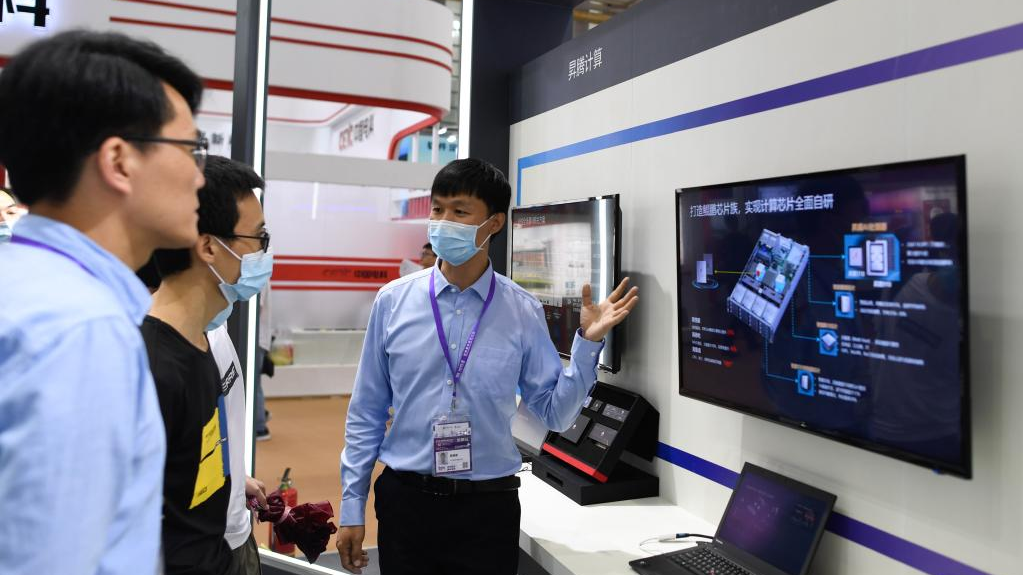
A staff member of China's telecom giant Huawei presents its self-developed chip technology at the 10th China Smart City and Intelligent Economy Expo in Ningbo, east China's Zhejiang Province, September 11, 2020. [Photo/Xinhua]
By Hayat Bangash
Watching China's progress in supercomputing in 2015, the U.S. banned the export of special Intel chips to places in China that were developing high-performance computers. A year later, China came up with its own chips, surpassing the speed of American supercomputers.
Now, after the notorious CHIPS Act and the "Chip 4" alliance, the Joe Biden administration on October 7 announced to restrict American companies from exporting chipmaking equipment to wholly Chinese-owned factories. Aimed at undermining China's chip industry, the measure attempts to cut off China from certain semiconductors made with U.S. equipment.
Such actions are nothing but a display of the insecurity that drives U.S. policymakers' attempts of retaining hegemony over the global economy. As China is consolidating its high-quality development, its established chipmakers and promising startups are upgrading their manufacturing technologies. Deplorably, however, Washington is in the grips of a fear that Chinese companies are going to erode the foothold of the American tech industry.
The phenomenon of putting roadblocks in the way of other countries' progress is not new. Georg Friedrich List, a German economist, talked about an immoral statute way back in the 19th century that on achieving a certain level of industrial capability, countries should kick away the ladder that enabled them to reach there.
The U.S. today is doing exactly that. In the words of Mao Ning, a Chinese Foreign Ministry spokeswoman, the U.S. is taking advantage of its technological edge to crack down on emerging markets. Nevertheless, as demonstrated earlier with the development of domestic chips for its supercomputers, China knows how to build its own ladders.
There are startups in China that have already bested the performance of high-end chips banned for export by the U.S. government. And China's AI computing power has exceeded that of the U.S., according to Pan Helin, co-director of an innovation research center at Zhejiang University. These latest capabilities prove that Chinese chipmaking companies have, for all these years, been competitors in waiting. As soon as the dominance of American chips faded, they surfaced to prove their mettle.

The White House in Washington, D.C., U.S., August 4, 2022. [Photo/Xinhua]
The American foul play in the global political economy is, in fact, adding fuel to Chinese innovation. Top Chinese startups have raised $2.5 billion in recent years and investment is flowing in from local companies for augmenting research on AI chips, especially for autonomous and intelligent vehicles.
Leading the national effort is Shanghai, the hub of the country's semiconductor industry. By the end of last year, Shanghai's semiconductor market formed a quarter of the national total with over 1,000 leading enterprises.
Authorities announced last month that the city, armed with a set of new policies, has started mass producing advanced 14-nanometer chips. This came three days after a Reuters report revealed that the U.S. Commerce Department has asked top American companies to stop exporting equipment to factories in China that produce chips of that length.
The announcement by Shanghai authorities is also being considered the first official recognition of the ability to locally mass produce such advanced chips. While this is going to help the development of new energy vehicles, intelligent manufacturing, and Internet of Things, it has placed China on the path to becoming a powerhouse of high-end manufacturing.
The country is achieving milestones at this pace with a unique strategy that engenders innovation. On one hand, full play is given to the role of the market, while on the other, national resources are mobilized to make breakthroughs in core technologies. Moreover, strategic projects in the field of AI, quantum information and integrated circuits outlined in the 14th Five-Year Plan are driving nationwide innovation.
The result can be measured by China's 12th rank in the Global Innovation Index 2021 – moving up 22 places within a decade.
Meanwhile, American companies affected by their government's curbs are raking in losses.
Sales of semiconductor equipment to Chinese mainland were sized at $29.62 billion last year, accounting for over a quarter of the global share, according to SEMI, an international semiconductor industry website. The vacuum left by American companies here cannot be expected not to be filled.
As soon as news of restrictions on American companies started trickling in last month, share prices of China's domestic chipmakers began surging. The added revenues and the renewed government support will certainly usher in a new dawn of innovation and self-reliance for Chinese companies.
Hayat Bangash is a freelance columnist on international affairs with degrees in business administration and war studies.

 中文
中文



